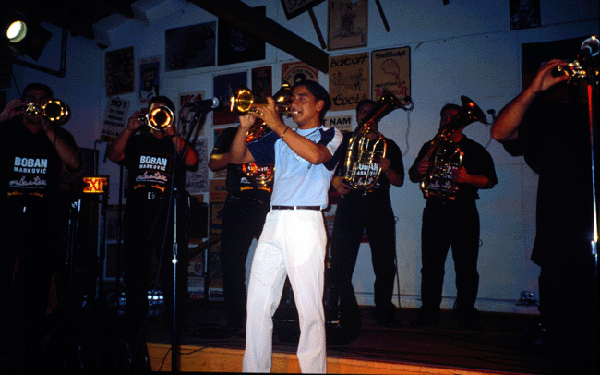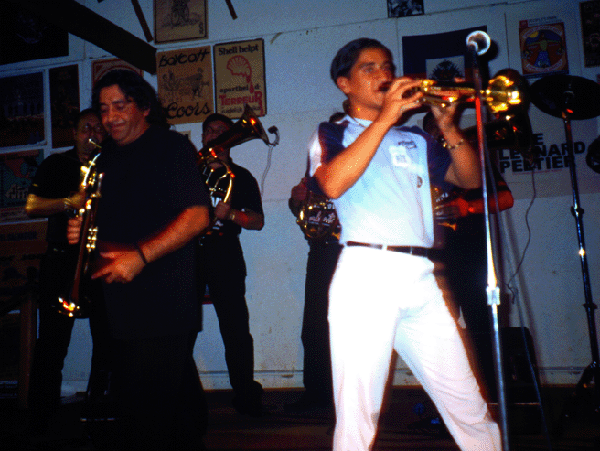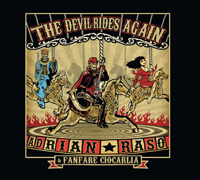
FANFARE CIOCARLIA + ADRIAN RASO
THE DEVIL RIDES AGAIN (Asphalt Tango)
This century, Balkan music emerged from small folk venues to become some of the hippest sounds breaking out of Eastern Europe. Fanfare Ciocarlia, from Moldova, had a hit a decade ago with their album Devil's Tale and have reunited with Canadian rock guitarist Adrian Raso from that session for another dose, called The Devil Rides Again. For "Stromboli," Raso adds a Duane Eddy twang. He also plays banjo which seems more in keeping with folk music, but he twists some devilish runs on Django Reinhardt's "Blue Drag" and "Roma Stomp." There are some unusual covers: Dolly Parton's "Jolene" for one (but it was unrecognizable to me). Steve Winwood was only 19 when he sang "I'm a man" with the Spencer Davis group. That song was one of the great anthems of my own youth, and was also a hit for Chicago in 1968. Now it has resurfaced in the repertoire of this brass band, with a vocal version last year and now an instrumental with added guitar. However, the guitar tends to overwhelm the other instruments including the excellent saxophone of Opricå Ivancea. Still it's one to check out.
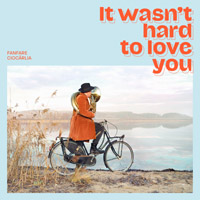
FANFARE CIOCARLIA
IT WASN'T HARD TO LOVE YOU (Asphalt Tango Records)
There's a little hidden gypsy village in North-Eastern Romania where eighty families have farmed with horse-drawn ploughs, and kept geese and played music on brass instruments for generations. It's a forgotten part of the world, though now a part of the EU, where there is even a "merry cemetery" in Sapanta. 25 years ago — post-Ceausescu — Henry Ernst, a young German music fan, wandered through and heard this ferocious rip-tempo music (ironically their name means' Lark's song) and knew he had found something unique. Since then, they have been sampled, remixed, featured in Borat's movies and their own films (Gypsy Caravan, Iag Bari) and toured the world to great acclaim. This is their first album since 2016's Onward to Mars which won Songlines' Best European album of the year. It's hard to categorize their sound which embraces both punk and classical simultaneously. In addition to traditional gypsy themes, like "Ma maren ma," they always throw some Western pop into their performances, such as the James Bond theme, Gershwin, or "Born to be Wild." Taking a cue from Borat's nonsense strangulated accent they don't hesitate to sing in broken English which would be laughable were it not for great backing on Bill Withers' "Just the two of us," which opens the album. It's mostly breakneck pace, though they do have lyric moments like the slow opening of "Busbus," but they build to a crescendo with "Demon dance" and "Cruzzzando el Campooo" before going through the roof like a group of figures in a Chagall painting, on "Mosquito swamp."
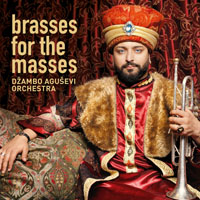
DZAMBO AGUSEVI ORCHESTRA
BRASSES FOR THE MASSES (Asphalt Tango Records CD/LP/download)
The Dzambo Agusevi Orchestra is a Macedonian brass band keeping the traditional sound of Balkan brass alive. Dzambo Agusevi, the leader, explores the various regional styles of the former Yugoslavia with a mix of disco and traditional Gypsy brass hoedowns. The young trumpeter is known as the "Funky Tiger" and has become the most famous Macedonian musician since the late Esma Redzepova. He grew up in the gypsy brass band world, son of another trumpeter, while listening to jazz, funk, Turkish music and movie soundtracks also. The vocals on the title track use a telephone effect, which was a style briefly popular before Dzambo was born. In "Macedonian Nightcrawler" you can detect the influence of John Barry, composer of the James Bond theme, as well as the walking bass on tuba that is a staple of brass bands from all over, even the great Lester Bowie's Brass Fantasy. John Lee Hooker's influence is manifest on the vocals of "Old Bazar Groove"! Asphalt Tango has assembled an incredible library of historic and contemporary gypsy music, and everyone should be well stocked up on it.
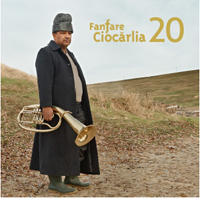
FANFARE CIOCARLIA
20 (Asphalt-Tango LP-ATR 5316)
Fanfare Ciocarlia, the Balkan gypsy brass monsters, present a smashing compilation from their many albums to celebrate their two decades in the spotlight. You may have missed their earliest releases Radio Pascani, and Baro Biao, which were on the Piranha label. They are sampled here, and this set also draws from their live album and Balkan Brass Battle as well as including one previously unreleased track as a closer. The only thing missing is their goofy cover of "Born to be Wild," which was on the Borat soundtrack. I wish they'd used it instead of "I put a spell on you," from their last release Onward to Mars! Their career was launched in the mid-90s at the height of the CD era and so they have not appeared on vinyl before. This two LP set throws down 90 minutes of intense churning grooves, with those fine moments when they stop on a zloty and the silence pulsates for a split second before they launch back in with all horns blaring. Drawing from their repertoire the group has selected tunes around four themes, one for each side, that are "Roots" (their beginnings as a village brass band), "Orient" (their Eastern-leaning recordings), "Jams" (their funkiest club tracks) and "Amigos" (showcasing their collaborations with Esma Redzepova, Boban Markovic, Dan Armeanca, and others). It's a fantastic collection: from the first notes of "Besh o drom" you know Nino Rota is listening to them from Heaven with Bartok, Kodály and Dvorak adjusting their collars nervously. My favorite side is "Orient" which draws 6 cuts from 5 albums and is a fine sequence. Highlights of this side include "Foxtrot" with their late clarinetist Ioan Ivancea (who died in 2006 and has not been replaced). "Jams" has the tunes you recognize, from the James Bond theme to Ellington's "Caravan," Gershwin's "Summertime" (from their Live album, sounding very N'orlins) and "Moliendo Cafe" By Eddie Palmieri. There is one inexplicable number in this set: "I'm your gummy bear," which I found on YouTube and I strongly advise you against going looking for it. "Amigos" which is mostly drawn from Kings & Queens has all the guest acts, including Saban Bajramovic singing "Ma Maren Ma" with one of the four trumpeters adding a poignant mute, and the closer with Socalled (no relation, I don't think, to Socalled Islamic State, but he should change his name pronto) and Kottarashky & the Rain Dogs, which I would have left off. As I said in my review of Kings & Queens they cast a wide net to embrace all the gypsies of the diaspora so there's flamenco guitar and Bollywood-sounding breakbeats ("Duj Duj"). Back to the start and their classic tracks like "Lume Lume," with its oceanic brass tides swelling, and the urgent telegram of "Hora De La Bucuresti" and their signature tune "Ciocarlia," which you may not know, demand repeat play.
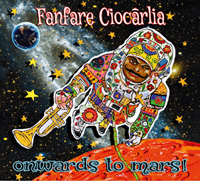
FANFARE CIOCARLIA
ONWARDS TO MARS! (Asphalt Tango CD ATR5116)
There are little villages in Romania where you cannot move for mud or slush, where the rain falls horizontally and the chill bites to your bones and no one expects to get out alive. Why leave anyway? You'll only be persecuted for being a gypsy and here at home there's grain alcohol to warm your bones and music for your soul. But music is the passport and gradually villagers from Zece Prajini and places like it found they could go to Serbia and play at the Guca trumpet festival and soon there was a demand for their music outside Eastern Europe: in Germany and beyond. Hip DJs started remixing their wild tunes and inciting riots on the dancefloor. So why not shoot for Mars? The music Fanfare Ciocarlia plays is not alien, it may have an "oriental" air to it, but that is the essence of the gypsy clarinet and the rumbustious bass played on a tuba. Their tuba player sometimes feels like he has been blowing up air mattresses for 24 hours straight (back in the late 60s when I hitch-hiked through Eastern Europe everyone was craving Lilo air beds)! You too may be exhausted from listening to 45 minutes of this intense blast of wild music and need to lay down, but you will notice that on their travels they have absorbed some great ideas. And they do slow it down from time to time, like on "Saints and Dates," which has a Felliniesque air to it, but then again Nino Rota was not above lifting gypsy melodies for some of his most memorable pieces. There's a cover of "I put a spell on you," in credible English, and a cover of a Moldovan pop hit by Zdob si Zdub. To end they jam with a brass band from Medellin, Colombia, Puerto Candelaria: the result is "Fiesta de Negritos," This album marks the 20th anniversary of the band. A special commemorative album comes out on 2xLP on June 17, called 20; it will be a "Best of," plus they are on tour, with a rare incursion into the USA in April. Don't miss them.
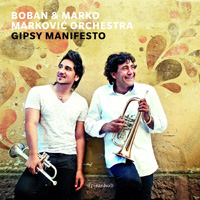
BOBAN & MARKO MARKOVIC
GIPSY MANIFESTO (Piranha CD PIR2753)
Sometimes you need raucous music to get going, and this fills the bill. It's the brass equivalent of punk rock and goes full tilt for the first 6 minutes before slowing down to a song with a melody, "Balkan caravan," (which even has words in English) and a sing-along "na na na" chorus. There's also some sharp soloing from father and son, showing why they deserve the "Golden Trumpet of Guca" which they won repeatedly. There are familiar refrains, even a remake on this, their first studio album in four years. (Last year a "best of" collection called Golden Horns charted in the USA.) The 2013 iteration of "Disco mayhem" is a highlight (It was on their Live in Belgrade album in 2002). "Cokolada (Chocolate)" is another high-energy romp with suggestions of early Ellington as much as Loony Tunes' Carl Stalling breaks, but the English lyrics are disappointing; sometimes it's better not to know how banal the words are: "Give some sugar to me and make my party sweeter: gipsy party recipe!" They do slow down after about 40 minutes but there's always a sense of urgency under the drummer's nervous ticking, even in the mellower moments, like "Afrika Paprika" which has echo on the horns and even an acoustic jazz pianist arpeggiating distantly in the background. "Bobanova saga (Boban's fairytale)" adds a sonic wash for background "mood." I don't think they needed to add a synthesizer but they try on many new hats here, from New Orleans to funk. The album ends with a remix/radio edit of "Sljivovica" which has that Electric Gypsyland feeling. It's a great way to end the disc, and another outstanding track.
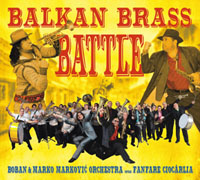
BOBAN & MARKO MARKOVIC VS FANFARE CIOCARLIA
BALKAN BRASS BATTLE (Asphalt Tango ATR CD2911)
To paraphrase Mark Twain, the only thing better than a brass band is two brass bands. So the Serbs meet the Romanians in coldest Transylvania to see who blows hottest. But why brass? Simply put, their fingers are too calloused from manual labour to play stringed instruments. These two giants of Balkan brass are out touring together and here they trade tracks and sometimes both converge on the same song, such as the "James Bond theme," "Devla" and "Disco Dzumbus." Boban has won the golden trumpet at Guca repeatedly and appears on numerous Kusturica film soundtracks. Each band has made my annual top ten once, so who is better? While they may care what we think, we just want to party down to their contagious Eastern funk. The joint "James Bond" theme is my favourite cut on here to put it diplomatically. Each outfit gives us a version of the Duke Ellington standard "Caravan." Markovic's mob has the edge on this one. (Though I think Taraf de Haidouks' version is best!) The joint tracks give you a chance to hear the mettle of each line-up as an ensemble but also with their respective soloists. In the final analysis I'd say Markovic is more brassy, with straight-ahead horns on the brink of the Apocalypse, while Ciocarlia manage to bring wistfulness and lyricism to their set without losing the edge. (Ciocarlia's line-up includes clarinet, 4 trumpets, 2 saxes, 2 tubas, 2 other horns and 2 percussionists; Markovic has 5 trumpets, 4 tenor horns, helicon, & 3 percussionists). If you can't get to see them on the same stage you will enjoy this chance to listen in.
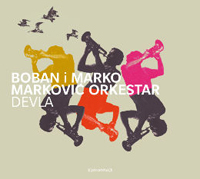
BOBAN I MARKO
DEVLA: BLOWN AWAY TO DANCE FLOOR HEAVEN (Piranha CD-PIR2339)
A couple of years back, Boban turned the band over to his son, Marko, but instead of retiring remains front and centre, prodding on the youngster in this latest sortie from the Balkan brass superstars. This is gypsy brass at its most incendiary. The occasional guest vocalists are excited, the band pumps away with tireless energy and you hear funk, rap and flamenco colouring their Rroma roots. For this disc the invited singers who front the group present different aspects of gypsy tradition; not that the Markovic Orkestar needs any help. The instrumentals, like Marko's "Khelipe e Chesea" are brilliantly realized and infectious in the worst way. But some of the tracks have a familiarity to them, "Maruska" is delivered by gypsy idol Mustafa Sabanovic in a declamatory yell. The band punctuates it with nifty tempo changes and in the gaps in the music you hear Boban and Marko echo the melody. Anyone who has traveled in the Balkans will enjoy the song of praise to Sljivovica, delivered as a droll rap
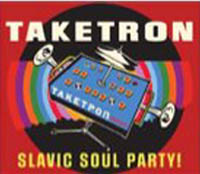
SLAVIC SOUL PARTY
TAKETRON ( Barbes Records)
The label that brought you the Chicha revival of psychedelic Peruvian pop throws another awesome set onto your virtual turntable. Slavic Soul Party are a well-known nine-piece ensemble in the New York Balkan party scene: mostly a bouncing brass line-up with a few added etceteras, they are versed in jazz, klezmer, and New Orleans funk, as well as gypsy styles. These off-the-grid youngsters also do covers so are about as versatile as any wedding band on the planet. Even unplugged, two trumpets, two trombones, sax or clarinet, & tuba tend to drown out the accordion. There's also percussion: a couple of basic drummers (snare and bass), and odd guest vocals. Individual members are from Mexican, Gypsy, Jewish, Cuban, Japanese and American backgrounds: not necessarily in any order. They've been honing their craft for ten years but have an edge that is unlike anything coming out of Eastern Europe, a result no doubt of the Brooklyn air they share. This is an exhilarating tour of inventiveness, from gospel to Raymond Scott (the frenetic "Sarba") and back via Skopje. "Canaan land" has strong elements of "The Saints go marching in" and is done as a Crescent City rave up. "Laughter club" has moments of tango intensity but most of it, for all its polish & little ideas borrowed from other gypsy brass ensembles, has a punky attitude that says this is our way. Dig it.
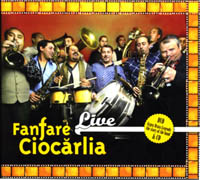
FANFARE CIOCARLIA
LIVE + GYPSY BRASS LEGENDS DVD (Asfalt Tango ATR CD 2309)
Here's a greatest hits live set from Fanfare Ciocarlia, with all the attendant high-energy pumping horns in stereo surround. The package also contains two full-length films about the group; one of them is concert footage of the live album, recorded in Berlin in 2004; the other a German documentary IAG BARI (Brass on Fire) about getting together to record their third album. The playing is tight and precise at first then gradually loosens into a more elastic notion of perfection as the energetic ceramic drums drive the tempo and the horns strive for approximate unity on the choruses. Madonna (the American pop star) is a useless human being with zero talent as a singer, but finally made a point by being booed in Romania for saying they (her fans) should tolerate gypsies (rather than just ogle her aging body in fishnets?). I read in the news recently about five gypsies being murdered in Romania in ethnic strife, so they have a long road ahead to social acceptance, and the films show you the conditions they live in. Pretty grim. For now music is their only escape. Their formula is neat: A solo instrument, trumpet or clarinet states the melody; one of them yells "Tzingari (Gypsies)!" and all of them jump in at full tilt. It's really exhilarating. Despite an ill-conceived and truly atrocious version of "Summertime" by Gershwin, they coast and toast their numerous hits and some gypsy standards, like "Lume Lume (Earth)," "Hurichestra," and "Iag Bari." The bad taste of the silly falsetto "Summertime" is rapidly swept away by the tune "Asfalt Tango," which indeed gave the record label its name, and is a scorcher.
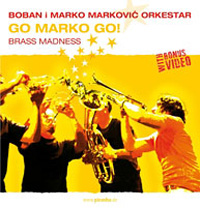
BOBAN I MARKO MARKOVIC ORKESTAR
GO MARKO GO! BRASS MADNESS (Piranha PIR 2121)
This time out the kings of Balkan brass show a different side of their sound. We now have jazz and funk to the fore and the gypsy swing apparent but not the dominant sound. It's the youngster's doing, and it bodes well for the future of this group to break out of their category and be recognised for their musical skill in any context. There's also a video clip that seems to be the trailer for a feature film, GUCHA, with young Marko as the star. There's many sounds present and they go out on a wild Bubumara medley. I turned the CD case over to see if there was some snappy quote I could crib for a review and there was my own praise of their last album. I was chuffed, even though I was thwarted in my attempt to find someone else's thoughts to bounce off, but suffice it to say, I think this is as good as their last outing, better perhaps. "Sina Nari" is a remake of another song. I am not good at Balkan song titles, but I can hear vocals in my head. It sets me dreaming: we are driving through Yugoslavia, isn't it? Loping and bumping along, but we don't have a flat because we are on a tractor. This is how Soviet heros travel. We are riffling through the parallax of endless furrowed fields, like a rotoscope. I am surprised to see watermelons growing. It is summer, after all. The air is still. We stop and cut faces in the melons, like at Hallowe'en, and eat the wedges we excise. A man with a trumpet is hitch-hiking. It is the young Herb Alpert. He flags us down. He is wearing a military tunic from a long time ago. The Ottoman Empire? With frogging and a big shako with a feather. He looks imposing. The musicians dance in a circle and get bigger and smaller rapidly like in a cartoon, puffing up then deflating as they exhale into their brass alter egos. How long can this sobriety last?
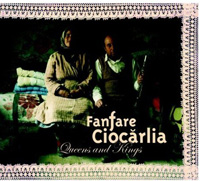
FANFARE CIOCARLIA
QUEENS & KINGS (Asphalt Tango ATR-1207)
After a lot of ersatz gypsy music a dose of the real thing is welcome. Fanfare Ciocarlia is the top Romanian brass band. This, their fifth album, is a tribute to their leader clarinetist Ioan Ivancea, who died last year. The band travelled all over Europe, from Bulgaria to France, to jam with gypsies of the diaspora and add many nuances to their sound. To their funky Balkan brass beat they have added flamenco guitar and Macedonian accordion, as well as the pop sensibilities of homeboys KAL. Though these sounds are quite disparate they have been part of the musical heritage of all gypsies through centuries of musical exchange and more recently cassette tapes which have brought Latin, jazz and pop touches to their sound. So this is a showcase album, reminiscent of Tito Puente's 100th album (I almost said 100th anniversary) where he recorded and toured with Johnny Pacheco, Celia Cruz, and a host of luminaries; which was good in theory but not in practice as it was 3 a.m. by the time Celia came on.) The top pop singers, Dan Armeanca and Jony Iliev show up, as do Esma Redzepova, Mitsou, Ljiljana Butler and other gypsy singers, but it's the arrangements and horn solos I find engaging. Armeanca, who has sung with the band before, kicks things off with "Kan marau la," possibly the strongest track on here. The 11-piece orchestra is in top form, having absorbed old movie tunes, Turkish pop, and all the forgotten bits of musical history from "Blue Rondo a la Turk" to the Lamabada. Here is a whole cross-section of the best gypsy sounds around, presented in a rotating roster of styles. To crown the proceedings there's a farewell march in honour of Ivancea, and then a raucous outro rip-up of "Born to be Wild!" which was apparently a hit in Sasha Baron-Cohen's BORAT film.
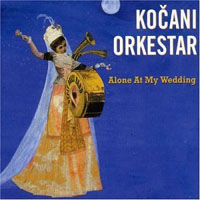
KOCANI ORKESTAR
ALONE AT MY WEDDING (Crammed Disc CRAW25)
It's been too long (7 years) since we heard from Kocani Orkestar, so this was a welcome arrival from Macedonia via Belgium's top-ranked world music label Crammed Disc. Kocani were all over the great ELECTRIC GYPSYLAND compilation but those were remixes. Here is the raw material from whence some of those great tracks arose, starting with "Siki, siki baba." This is the third album by them, not including their guest shot on Taraf de Haidouks' BAND OF GYPSIES: their debut disc GYPSY MAMBO is phenomenal. This one also delivers with a funky rhythm section consisting of a drummer and four tubas for the bass part! Here they are joined by guests on vocals, banjo (substituting for a lute, and sounding darn like one), clarinet, derbuk, etc, for a set of gypsy wedding music. The band has undergone a complete change of personnel since their debut, with leader Naat Veliov and his brothers gone and Ismael Saliev, on alto sax and vocals, now heading the ensemble. The liner notes describe the various quaint wedding customs: At dawn on the second day, everyone jumps in the river; the women get drunk, men paint their faces with lipstick, rip off each other's shirts and start a bonfire, etc. But the music component is what we are here for: the brass band parades through town collecting the participants and then is replaced by smaller combos, and here Kocani provides all the parts. The party builds in intensity as the album progresses. The rhythms become more complex. A truly satisfying hour of arabo-turkic-romany boogie.

BOBAN MARKOVIC ORKESTAR
THE PROMISE (Piranha CD PIR1901)
Boban prods his son, Marko, to the fore for this outing, but there is continuity and the album delivers for those needing a fix of extreme Balkan Brass. The big band turns on a dime (or maybe a zloty?) effortlessly, their melodies sustained on the air like hovering strings or respiring like a celestial organ. Europe and Asia collide at the Carpathians or thereabouts and myths as well as music are thrown skyward by this natural & cultural upheaval. These genuine Gypsy Kings slow down long enough to give us one song, a lament sung in Macedonian. The other tracks are all instrumental but there is a mournful voice in the trumpets which has a tone stretching back over the centuries to Rajasthan and the Punjab whence these migrants began their trek to our day. They also recall the primitive oboe in their phrasing and pitch and the whirlwind of brass that surrounds them recalls the might of the Ottoman army on the march before their bands were dissolved in 1839 and splintered into the little village units. But, their influences are legion. The track "Meksikanka (Mexican girl)" intrigued me as I tried to figure out what the source was. Herb Alpert? No, nothing that obvious... And the moody "Noc je (It's night)" quotes Miles Davis's "Concierto de Aranjuez" -- or is it "Elevator to the gallows"? I don't listen to much contemporary jazz since it became a lifestyle rather a musical form, but there's plenty of virtuoso playing, provoking ideas and tricky rhythmic games to get you caught up here.
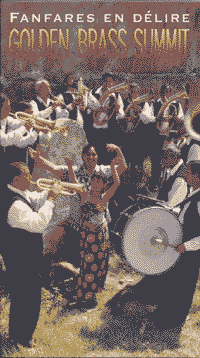
VARIOUS ARTISTS
GOLDEN BRASS SUMMIT (Network)
A customs agent once stopped Buddy Hackett and pointed to his trumpet case. "Is that a musical instrument?" he asked. "Sometimes," replied Hackett.
So far I have had positive reactions to my own brass band compilation, as well as good suggestions for a better name, though I think "Horn to be Wild" is a bit over the top. But no label has taken me up and offered to issue it. The German Network label has put out their own monster double-CD set short-titled GOLDEN BRASS SUMMIT, subtitled "Fanfares en délire" and also known as 40 YEARS OF GUCA: AN ANTHOLOGY OF THE BIGGEST BRASS FESTIVAL IN THE WORLD. It's over two hours of stimulating music. This Balkan brass festival began under Tito when half the repertoire was patriotic songs of mixed ethnic derivation. These have been omitted from the compilation as Ilija Stankovic says he's had enough of them! He also points out how the "white" orchestras from Western Serbia were favored over the "black" Rroma bands from the South and East, though the latter were invariably superior musically. When the festival began in 1961, folk dusted off their ethnic costumes that had been in mothballs since the Second World War and soon the aromas of boiling cabbage, spit-roasted meat, and hot schnapps were filling the air. One of the founders of the event wrote at the time, "The trumpeters stand on stage and play for four hours, trying to outdo one another. Their trumpets glisten like golden ducats, their songs are melancholic, about the transience of beauty and the stubbornness of sorrow. The 'cocek' dance is fiery, whereas the 'kolo' flutters across the meadow like a ribbon. The audience spares neither their hands nor their feet..."
Balkan brass music has returned from the brink of extinction, largely due to this annual festival, which now has tens of thousands of attendees. The compiler went through 1500 tracks, many of them in deteriorating condition, to find the best for this compilation. It's a non-stop joy and a delight for the ears. Brass bands can get frenetic and seem like torture but this compilation balances the jiggy gypsy stuff with the melodic folk tunes and shows the love and care that went into its creation.
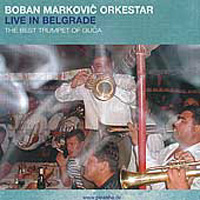
BOBAN MARCOVIC ORKESTAR
LIVE IN BELGRADE (Piranha PIR CD 1685 )
Struggling to be atop the gypsy playlist is Boban Markovic and his Orkestar LIVE IN BELGRADE, on the top-notch Piranha label. It's a long time since I was in Beograd and it was grim then, I can't imagine what the years of war and hardship have done to the place, though the old stone walls surely must be standing, if a bit more pitted. I remember one night in Nish, in the south of country (then cohesive Yugoslavia, under Tito), being taken to visit a local curiosity: the skull tower. I wasn't prepared for what I saw: a whole tower built of human skulls -- a legacy of a visit by the Ottoman Turks. Those Serbs and Macedonians learned how to make an impressive statement, though I'd rather they were all musical ones. The martial might of a big brass ensemble has not dimmed and they come on furiously like a horde of invaders with "do or die" on their minds. In fact, the liner notes by Frank London (himself an accomplished musician) argue that if Bill Clinton didn't play sax all these guys would be dead in the NATO bombing. Fans of Boban know he has won the Golden Trumpet at the Annual Guca festival so many times he's been excluded from competition.
Just to establish some basics, they kick off with a rousing "Hava Naguila" (the giant lizard that ate Cuba?) but quickly get to showing off their chops. Most of the selections are traditional. Boban leads the pack with his flugelhorn and occasional vocals; there are three other flugelhorns, a sax and four tenor horns (which look like supersized trumpets), a helicon for bass, and a snare drummer and bass drum. On "Ring Ring," Boban holds a long high note while the rest go oompah-doom oompah-doom and the sax wails some "call to prayer"-like descant: It's truly immense. The Serbian-gypsy fun continues with a riotous track called "Disco Dzumbus" which lives up to its name! The penultimate 11-minute melody goes through the roof. As London says, the loudest unamplified band you've heard: they don't need no steenking drum machines! Break out the slivovica and prepare to get down!
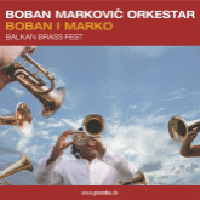
BOBAN MARKOVIC ORKESTAR
BOBAN I MARKO (Piranha CD PIR1790)
More hot stuff from the leading exponents of gypsy brass band music out of Serbia. We can't fault the musicans for their stirring martial qualities, even if the country seems to be perpetually gearing up for more war. Boban has been joined by his 15-year-old son Marko, also on flugelhorn. There is a ragged quality to the music which makes it seem hasty at times but the soloing is exceptional. Frank London's Klezmer Brass All-stars join in for one resounding tune, but the surprise pick on here is a Hindi filmi tune. This is at a third remove as it's a cover of the Bollywood Brass version of A.R. Rahman's "Mere Yaara Dildara"! This is a feast for brass music fans.
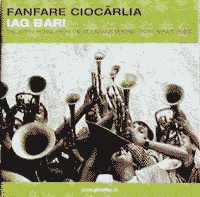
FANFARE CIOCARLIA
IAG BARI (Piranha CD1577)
If a couple of horns are hot then a dozen should be killer, right? You betcha. I have been enjoying the new gypsy brass band album from Piranha called IAG BARI by Fanfare Ciocarlia. Brass band music is one of my guilty pleasures but I didn't dig the last album from this unodecatet (if that's what you call an 11-piece band). It seemed too frenetic, or maybe it was just my frame of mind at the time I listened to it. Also I have high standards for gypsy brass, measuring everything up to the Koçani Orkestar from Macedonia. This new release from Fanfare Ciocarlia of Romania starts calmly and gives you a few minutes to prepare for the full onslaught from the Carpathian mountains. Insect and ambient sounds, fire crackling, a guitarist warming up, conversation: all subside before the first big onslaught. The title cut is driven with a relentless techno beat on a tsunami of battered brass. Another stand-out track is "Hurichestra" which is a whirlwind of soloing in one of those gypsy time signatures, like 13/8. There are a few breathers but mostly you get the Looney Tunes on speed where everyone is trying to play faster than the next guy. They reportedly reach 200 beats per minute but I can't count that fast. There are some old melodies which reminded me of Nino Rota film scores so there's a lot of latent dreamwork in these grooves. One theme, "Besh o Drom," which means "Keep on walking" was used by Rota for his score for "The Godfather" so you will immediately start humming along.
Dan Armeanca, the godfather of Oriental pop, sings on a couple of cuts. He became known as the Michael Jackson of Romanian pop but retreated from the limelight to explore jazz, reggae and folklore, as opposed to the "fakelore" gypsy music sanctioned during the Ceausescu regime. There's a guest muted trumpet player, Costel Vasilescu, adding a velvety tone to two tracks in contrast to the crisp staccato of the ensemble. These tracks leap out and hook you in. An accordion and violin ensemble appear on two further tracks and there's also an appearance by some singing Bulgarian ladies, making a well-paced album.
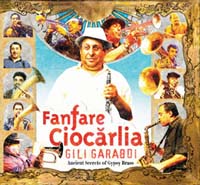
FANFARE CIOCARLIA
GILI GARABDI (Asphalt Tango CD ATR0605)
In this globalized music scene bands have to reinvent themselves. It's not enough to be a gypsy brass band, you have to transcend niche markets, so it's great to hear Fanfare Ciocarlia rise to the challenge and give us ska and jazz along with a resounding blast of rampaging Romanian brass for their fourth CD release. They kick off with "007" in an arrangement that (I think) was a hit for the Specials. Then the romping tubas pump it up as they go into the first version of "Alili," my pick to click from this set. Track three asks the musical question: How fast can you play the trumpet? I guess it has to do with the amount of slivovitz you consume during the performance but of course as you get faster you get sloppier, and inevitably the audience lose count as one by one they pass out. I've heard other gypsy bands, including Taraf des Haiduks, perform Ellington (& Tizol)'s standard "Caravan" & there seems more than a passing connection to their indigenous rhythms, so there may be something to the liner notes' claim that gypsy musicians who came to the US in 1864 settled in black ghettos in the South where they added their music to the local mix that eventually became jazz. However you take it, this is a great version. Johny Iliev steps in to do his ballad "Ma maren ma," then we are off again on a mad dash -- this time clarinets pursued by the pumping tubas on "Hora arabeasca." Track 7, "Golden days," sounds familiar, and so does "Lume Lume," which comes from folklore, and makes you start wondering if you were a gypsy in another life. "Moldavian mood" has another wonderful trumpet lead and chorus over a rollercoaster of a backline on all the other horns. Now you can't con me here: "Hora evreiasca" is based (uncredited) on the Pink Panther theme of Henry Mancini. The album ends with a bass-heavy remix of "Alili" which has more echo and a girl humming along. It's gimmicky but lacks the sustained force of the "straight" version. But overall this CD is a gem and another rousing set from the lads from Ciocarlia.
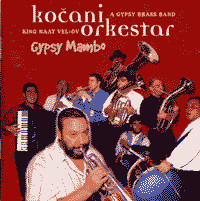
KOÇANI ORKESTAR
GYPSY MAMBO (Yeni Dunya Muzik 3051632, distributed by Wagram)
Hailing from Koçani, Macedonia, the Koçani Orkestar performs traditional Rroma brass band music for parties and rituals such as weddings, circumcisions and funerals. Their big break came when they were featured in the film TIME OF THE GYPSIES, and GYPSY MAMBO (on Yeni Dunya Muzik, a Turkish label) is their third recording, combining Turkish dance and pop music, as well as Serbian and Romany gypsy airs.
Traditional Macedonian brass bands -- which were founded when the large military bands were banned in the mid-nineteenth century and subsequently fragmented into smaller ensembles -- play in unison with each instrument taking a turn at improvising on the melody. This group, under the lead of trumpeter Naat Veliov, uses a Western approach with the tuba playing a bass line, baritone instruments playing chords and the melody carried by the trumpet and clarinet. Unlike most Western bands, however, this ensemble plays in 11/8 time (2+2+3+2+2), as well as 7/8 and 9/8. Try counting or clapping along for insight into the way the tunes are structured.
Koçani also adapts Turkish muslim pop music as well as other arabic styles. The title track, "Gypsy Mambo," shows Veliov's adaptation of Latin rhythms which works really well. Among the other styles represented are "techno," "Gypsy staccato," and "Oro Indi" -- a style adapted from the popular Indian filmi soundtracks. But Veliov must listen to a lot of music; among his influences I detect a touch of Cootie Williams and other stalwarts of the Duke Ellington bands.
